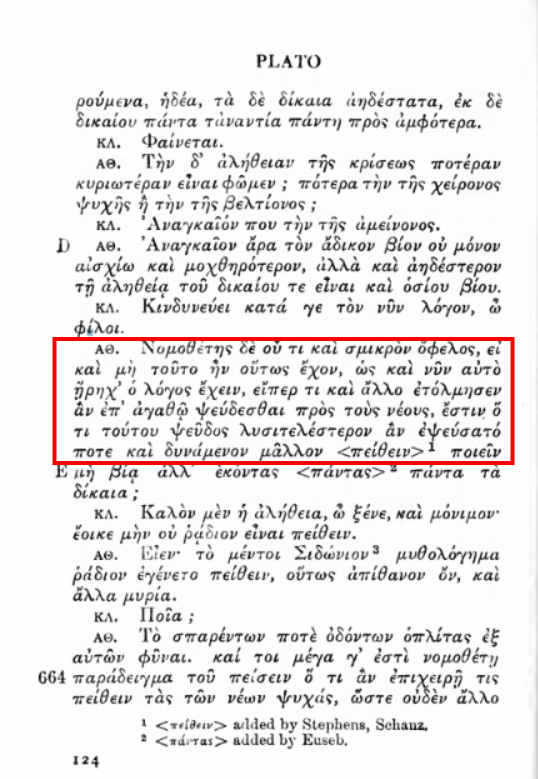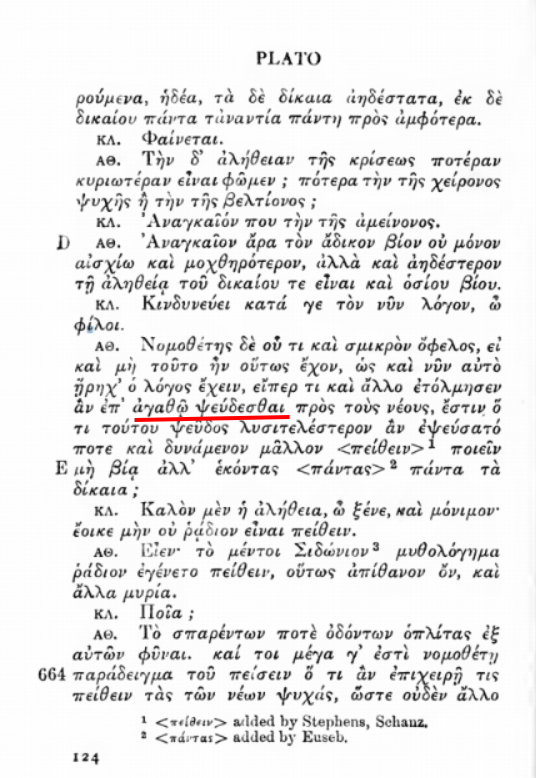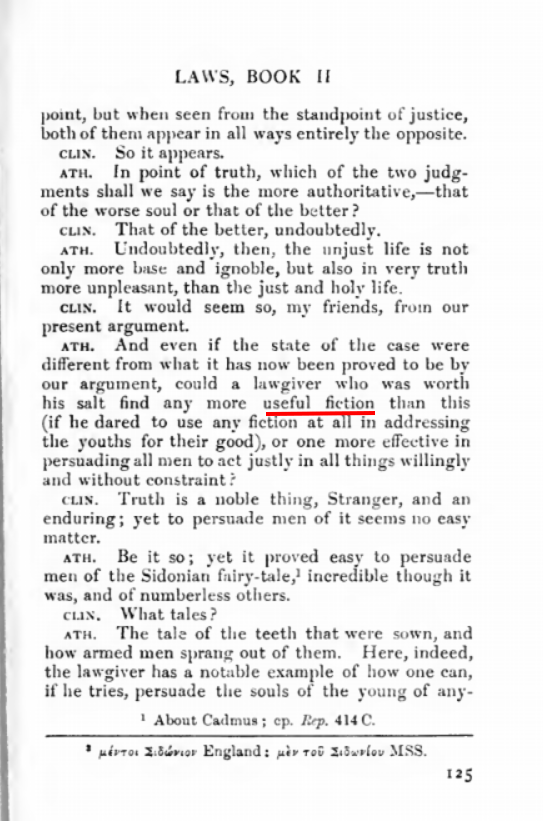Mythmaking of Early Christian History by Eusebius
Question:
A lot of what we know about the early Church comes from Eusebius, is he a reliable source of information?
Answer:
In his work, Praeparatio Evangelica (Preparation for the Gospel), Book 12, Chapter 31 is titled as follows:
“That it will be necessary sometimes to use falsehood as a remedy for the benefit of those who require such a mode of treatment.”
Eusebius makes it clear that Christians have to necessarily lie, use falsehoods for the propagation of the Gospel message. It is therefore quite difficult to trust someone who is seen as a historian who openly argues that as a Christian, it is necessary for him to use falsehoods. This is not a teaching that is hidden away or poorly translated, this is someone making it absolutely clear that lying is necessary when it comes to the Gospel message. Chapter 31 reads as follows:
“But even if the case were not such as our argument has now proved it to be, if a lawgiver, who is to be of ever so little use, could have ventured to tell any falsehood at all to the young for their good, is there any falsehood that he could have told more beneficial than this, and better able to make them all do everything that is just, not by compulsion but willingly?”
Eusebius is referencing a Platonic argument from Plato’s Laws. This argument essentially means that it’s okay to lie, it’s okay to hold a false belief, if in the end the lie benefits someone morally. An example of this is to teach the Gospel message and even if the Gospel message is false, invented, a myth, by believing in this lie, someone may stop being promiscuous. They may stop stealing due to their belief in a false Gospel message. The person does not know the Gospel message is false, they believe it to be true, and so despite unknowingly believing in a false teaching, they still morally benefit in the end.
Plato’s Laws
Eusebius is referencing the following argument from Plato found in Plato’s Laws (translated by R.G. Bury 1926):

The Greek phrase we need to focus on is, “ἀγαθῷ ψεύδεσθαι” (agatho pseudesthai):

Which he translates as follows, “useful fiction”:


Plato puts forth the idea of “ἀγαθῷ ψεύδεσθαι”, or as translated, “useful fiction”. Eusebius then borrows this idea and applies it to Christianity, with the conclusion being that it is necessary to lie as a Christian because even if the belief is false, a useful fiction, in the end a person is morally better off due to believing in that lie. As he (Eusebius) argues, “is there any falsehood that he could have told more beneficial than this“.
Christian Apologists on Eusebius’s Controversial Argument
In “The Case for the Resurrection of Jesus”, by Gary Habermas and Michael Licona, they offer a re-contextualizing of what Eusebius said. Their argument can be summarized as claiming that Eusebius’s use of the phrase, “ἀγαθῷ ψεύδεσθαι” (useful fiction, falsehood, lie), does not mean what the text says. They begin by saying on page 275:
“It may be helpful to look at the Greek employed. The word used by Plato is pseudos, which typically means a lie or imitation”.
They acknowledge that the standard use and meaning of the word, “ψεύδεσθαι”, is one of dishonesty. After establishing the normal use of the word, they attempt to argue that Eusebius (in quoting Plato), meant to argue for a “good lie”.
“However, Plato’s context and the passage may justify a nuance for the following reasons: (1) Plato uses the term, “good lie” (agatho pseudesthai), eliminating harmful intent.”
They continue:
“One translator renders the term as “useful fiction,” instead of “falsehood” (Plato in Twelve Volumes, 12 vols, R.G. Bury, trans.[Cambridge, Mass.: Harvard University Press, 1914-1935], 10.125).”
The leaps in reasoning they make are quite ridiculous to say the very least. A good lie, is still a lie. Though the intent may not be harmful, to say that it is necessary to use fiction and falsehoods to achieve some moral goal, does not preclude the fact that he argues that it is necessary, required, obligatory to use falsehoods to convince people of the Gospel message. For some odd reason, they found it important to mention that one translator uses the term “useful fiction” instead of “falsehood”. I’m not sure why they found that this difference in translation needed to be mentioned as the end result is still that Eusebius argued for the necessity of fiction and falsehoods within the Christian faith.
Usage of “ψεύδεσθαι” (fiction, lie, falsehood) in the New Testament
There are some 12 occurrences of this word in various forms throughout the New Testament, every instance of which uses it in the context of dishonesty:
- Matthew 5:11, “…against you falsely, for my sake.”
- Acts 5:3, “…your heart to lie to the Holy…”
- Acts 5:4, “…in your heart? You have not lied to men…”
- Romans 9:1, “… in Christ, I am not lying, my conscience…”
- 2 Corinthians 11:31, “…God, I lie not.”
- Colossians 3:9, ” Do not lie to one another…”
- 1 Timothy 2:7, “…the truth, I am not lying) as a teacher…”
- Hebrews 6:18, “…for God to lie, we who have taken refuge…”
- James 3:14, “…do boast against and lie against the…”
- 1 John 1:6, “… in the darkness, we lie and do not practice…”
- Revelation 3:9, “…that they are Jews and are not, but lie— I will make…”
Thus, the normative use of the term in the New Testament literature, agrees with the aforementioned conclusion that it refers to dishonesty, falsehood and lying.
Conclusion
From having read both Plato’s use of the argument and Eusebius’s copying and appropriating of it, the end result is that:
- It is a necessity to use falsehoods to spread the Gospel message,
- because it is better to believe in a falsehood that makes you morally pure,
- than to live and behave unjustly.
Even if Eusebius had good intentions, he still considered it a necessity to lie about Christianity to win converts, for him, the ends justify the means. It would therefore be difficult to believe that his writings are historically accurate and objective. His representations of competing groups of Christian sects may not be impartial, and there is no way to validate his version of early Christianity.
and God knows best.

‘..he still considered it a necessity to lie about Christianity to win converts, for him, the ends justify the means. ‘
It reminds me of narrative i read, a long time ago. Christian missionaries failed to convert Indians, so they change their own scriptures to gain converts.
“The Panare killed Jesus Christ, because they were wicked. Let’s kill Jesus Christ, said the Panare… They laid a cross on the ground…” etc. The New Testament continued: “God will burn you all… God will exterminate the Panare by throwing them on the fire… ‘Do you want to be roasted in the fire?’ asks God. ‘Do you have something to pay me with so that I won’t roast you in the fire? What is it you’re going to pay me?'” One does not have to think hard in order to realise what payment was being demanded; namely, unquestioning submission to the missionaries’ demands, the abandonment of their traditional lives and their customs, and the acceptance of Christianity. The Indians were terrified. The first Indian woman came forward and said: “I don’t want to burn in the big fire. I love Jesus.” (Adapted from Norman Lewis, The Missionaries, Arena 1989, pp.188-192)
> Eusebius makes it clear that Christians have to necessarily lie
What nonsense. I just read the argument of Eusebius and he is not commanding Christians to do anything of the sort. If you want to know what Eusebius is saying reading the whole argument.
Christianity has no doctrine of taqiya; stop trying to impose one on it. Our guide has always been:
Mat 5:37 Simply let your ‘Yes’ be ‘Yes,’ and your ‘No,’ ‘No’; anything beyond this comes from the evil one.
2Co 4:2 Rather, we have renounced secret and shameful ways; we do not use deception, nor do we distort the word of God. On the contrary, by setting forth the truth plainly we commend ourselves to every man’s conscience in the sight of God.
Pingback: Mythmaking of Early Christian History by Eusebius | kokicat
f you will not allow my comment or let me access to the other comment, then I wonder what god it is to remain on you email list? Ahaji.
Don’t know what other comment you posted, I’ll have to check the queue, we recently started auto-approving comments once the person has had an approved comment previously. Seems to be working so far.
Since this is your first approved comment, whatever you post next should be approved. If not, send us an email or use the Contact Us form.
Thanks for your feedback.
why do you lie samuel?
quote :
Mat 5:37 Simply let your ‘Yes’ be ‘Yes,’ and your ‘No,’ ‘No’; anything beyond this comes from the evil one.
end quote
quote :
But he was silent and did not answer. Again the high priest asked him, “Are you the Messiah,[j] the Son of the Blessed One?” 62 Jesus said, “I am; and
‘you will see the Son of Man
seated at the right hand of the Power,’
and ‘coming with the clouds of heaven.’”
end quote
here jesus thinks he is “the messiah” or the “king of the jews”
who else is “son of the blessed” ? who else is given power to crush his enemies in psalms? “king of the jews”
quote :
jesus before pilate
15 As soon as it was morning, the chief priests held a consultation with the elders and scribes and the whole council. They bound Jesus, led him away, and handed him over to Pilate. 2 Pilate asked him, “Are you the King of the Jews?” He answered him, “You say so.” 3 Then the chief priests accused him of many things. 4 Pilate asked him again, “Have you no answer? See how many charges they bring against you.” 5 But Jesus made no further reply, so that Pilate was amazed.
as everyone can see jesus LIED. he lied and played concealment game with pilate. the gospel authors are liars. jesus’ gave the command to the disciples to arm themselves, yet not one gospel writer has jesus revealing information like selling their stuff and arming themselves.
jesus LIED and then kept SILENT
the jews obviously accused him of being “king of the jews” because of what jesus said to the HIGH priest earlier on
jesus lied and told pilate “you say so”
“have you know answer”
the answer should have been “yes”
jesus DID Not follow his own “let your yes be yes and no be no”
“Mat 5:37 Simply let your ‘Yes’ be ‘Yes,’ and your ‘No,’ ‘No’; anything beyond this comes from the evil one.”
Why don’t you elaborate to prove your point Mr Samuel? I did read the “Praeparatio Evangelica” i still don’t find which part of the writings proves the opposite of what Mr Ijaz said…so can you please elaborate?